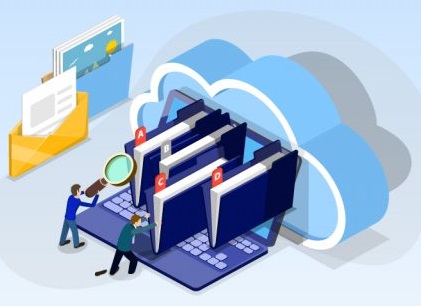Virtual Data Room (VDR) Definition

Technology has completely changed the way business is conducted globally and how employees work. Our smartphones, tablets, laptops, and SaaS tools have led to digital workplaces, teleworking, and a complete digital transformation, empowering teams to work more efficiently. Virtual Data Rooms, or VDRs, are part of this technological revolution and have drastically changed the way business deals are made today.
What is a Virtual Data Room?
An electronic data room, also known as a VDR or digital deal room, is a secure online repository for storing and distributing documents. It's usually used during the due diligence process before a merger or acquisition to investigate, exchange, and disclose company records.
VDR software is basically the next generation of data rooms. The latter was the physical rooms within companies where the relevant data would be stored. Detailed logs were kept for everyone who entered data warehouses due to the confidentiality of the data stored in them.
Filing cabinets behind locked doors was quite expensive due to excessive energy consumption. No wonder VDRs became a big improvement over the traditional method of storing sensitive data. Nevertheless, like many early technologies, data rooms were far from user-friendly at first. Now, online data room software implies extended cloud storage, but depending on the provider you choose, the virtual data room pricing, capabilities, and functionality can vary greatly.
Using Virtual Data Rooms
Mergers and acquisitions are the most common use of VDRs. M&A data room services provide a place for the due diligence required during the completion of a transaction. These business deals involve large volumes of documents, many of which are confidential and contain sensitive information. Utilizing an M&A virtual data room is a secure and reliable medium for all interested parties to view and share documents during negotiations.
Companies often work with each other to develop and manufacture products and/or to offer services. Organizing and maintaining these business relationships requires direct communication and frequent data transfers. Digital deal rooms provide storage for contracts and other files and make the documents readily available to continue business partnerships. For instance, changes made by an engineer to structural drawings are immediately available to all contractors involved in the project.
Auditing a company's practices, regulatory compliance and accounting is common practice in all companies. This process is often a challenge as workers must interact with external regulators and service providers. Besides, many companies today have offices in remote locations and around the world in different time zones.
Using data room software allows lawyers, accountants, internal and external regulators, and other stakeholders to have a centralized access point. The use of a central system reduces errors and time and ensures transparency of communication. Depending on the type of audit, the level of access and authority will vary.
Proposing an initial public offering (IPO) is a daunting task that requires an incredible amount of paperwork. As with auditing, transparency is important. Companies must create, share, store and manage large volumes of documents. According to the nature of the transaction, most users will have limited access, such as “view only.” Copying, transferring, or printing may be prohibited.
What Are the Benefits of Digital Data Rooms?
Online data room software is the solution for any business that wants to make document sharing easier and more efficient. A VDR can be a perfect solution for people with the following needs:
- Exchange of documents and important business information;
- Protecting company information;
- Document management and secure data management;
- Providing access to multiple parties at the same time;
- Support for mobile devices;
- Permission to download large amounts of data;
- Exact search functionality.
Working with a VDR is reasonable if you don't want to invest heavily in a physical data room. Business owners, customers, suppliers, buyers, executives, and managers are all good candidates for a VDR.
Are Online Data Rooms Better Than Cloud Storage Tools? Is There Any Difference?
At first glance, this is a reasonable question. There are many reasons why cloud storage is inadequate when it comes to today's data needs, and not just for large organizations – even small and medium-size businesses now routinely turn to virtual deal rooms, even when their data needs are relatively limited. The key factors are as follows:
- Depending on the file-sharing tool you use, each user might need to download an .exe file, install a program, and then access it when needed from that same desktop. It's not access – it's a barrier. Virtual data rooms provide better access to the people you want from any registered device.
- Anyone who has ever worked in a traditional spreadsheet program with over 5,000 results will recognize the issue of scalability. Even a medium-sized spreadsheet can crash your computer. But then, a virtual data room provides seamless access to data no matter how much data is stored.
Are Online Data Rooms Secure?
VDRs are considered extremely secure. In particular, ISO 27081 certification is thought to be the best choice for securing online repositories. The platform's security measures provide customers with the controls, reporting, and procedures they need to keep all their data and operations secure. As such, VDR providers take a comprehensive and multifaceted approach to securing online files. Several challenging levels work together to create a comprehensive barrier against potential risks and threats.
Here is a list of VDR features that make it more secure when sharing documents and data:
- Physical security: continuous data backup, more than 99.9% of uptime.
- Application Security: Encryption Methods, Digital Watermarks, Private Cloud Storage, Multi-Factor Authentication.
- Infrastructure security: 256-bit AES data encryption, data storage in remote data centers.
- Data Center Certificates: Various certifications such as SOC2, FINRA, ISO 9001/ISO 27001, and others.
- Auditing and Compliance: Activity audit trails for any activity in the data room.
839GYLCCC1992



Leave a Reply